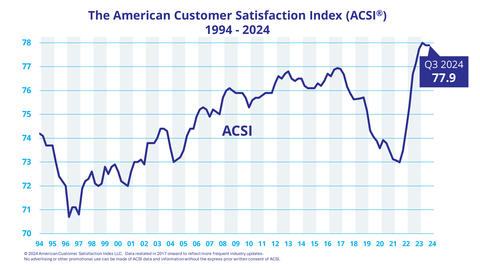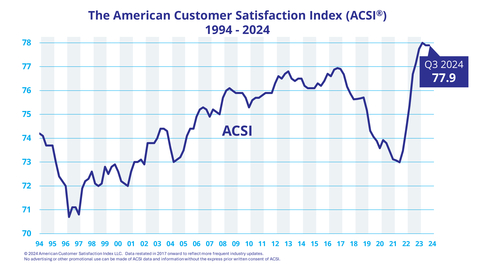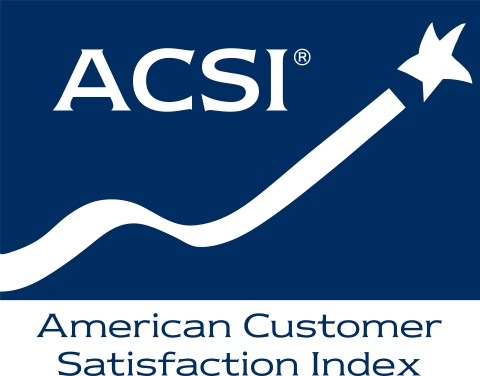ANN ARBOR, Mich.--(BUSINESS WIRE)--American Customer Satisfaction Index:
| The American Customer Satisfaction Index (ACSI) was established in 1994 at the Ross School of Business, the University of Michigan, under the leadership of Claes Fornell, the Distinguished Donald C. Cook Professor Emeritus of Business Administration. Expressed as a system of latent variable equations and populated with data from about 400,000 customers/consumers annually, ACSI tracks the quality of economic output (products and services) in the U.S. - as gauged by the consumers of that output. ACSI is complementary to GDP, which measures the (value of) quantity of economic output. Over the years, more than 16,000 peer-reviewed scientific articles confirm that company-level ACSI scores have an impact on earnings, cash flow, stock returns, earnings surprises, ROI, and a number of other important business performance metrics. |
The economy has pulled off something that seemed virtually impossible not long ago: strong economic growth and satisfied customers.
While historically remarkable, it is an even more impressive record compared to other countries. Over the past five years, U.S. economic growth has outpaced the other G7 countries by about 300%. Meanwhile, at a national level, customer satisfaction as measured by the American Customer Satisfaction Index (ACSI) holds in the third quarter of 2024 with a score of 77.9 (out of 100) -- nearly the highest it has ever been.
Consumer spending is by far the largest contributor to economic growth, and the degree to which buyers are satisfied or dissatisfied affects how much they spend. The advance estimate released by the U.S. Bureau of Economic Analysis shows 2.8% GDP growth in the third quarter and a 3.7% growth in consumer spending.
Over the past five years, the recession that caused economic havoc in many other countries, was largely averted in the U.S. However, worldwide supply chain problems caused product shortages and a strong labor market led to shortages in the service sector. That, in turn, made consumer markets less efficient, causing inflation and diminished consumer power.
“During this period, customer satisfaction mattered less and the national ACSI score had its steepest decline ever,” said Claes Fornell, founder of the ACSI and the Distinguished Donald C. Cook Professor (emeritus) of Business Administration at the University of Michigan. “The stock market became exceptionally concentrated, with fewer than 1% of the listed companies accounting for more than one-third of its capitalization. It no longer rewarded companies that provided strong customer satisfaction with excess returns. Although a recession was avoided, the markets did not function well.”
Now, things have changed. U.S. overall satisfaction is stable since the second quarter at a near record high. However, it is just 1.4 points higher than it was a decade ago. Companies still struggle with how to best allocate resources for improving the satisfaction of their customers.
While national customer satisfaction has not changed much, some individual companies show substantial ACSI movement. During the past decade, Bank of America, United Airlines, Cigna, HP, and Allegiant have seen double-digit percentage improvements in satisfaction.
On the other hand, Dillard’s, Entergy, and Chrysler are among those that have lost significant ground over the last several years.
Most industries continue to have high customer satisfaction elasticity. The higher it is, the more customer satisfaction impacts demand. Banks, internet service providers, financial advisors, and wireless phone service are among the highest elasticity industries. They stand to lose or gain the most from how they treat their customers. Financial punishment and reward are generally lower for general merchandise retailers, gas stations, and supermarkets because demand is more responsive to price and location in these industries. Overall, however, there is no industry or company in the Index that is financially immune to changes in the satisfaction of their customers. The higher the elasticity, the greater the competition.
For more, follow the American Customer Satisfaction Index on LinkedIn and X at @theACSI or visit www.theacsi.org.
No advertising or other promotional use can be made of the data and information in this release without the express prior written consent of ACSI LLC.
About the ACSI
The American Customer Satisfaction Index (ACSI®) has been a national economic indicator for over 25 years. It measures and analyzes customer satisfaction with approximately 400 companies in about 40 industries and 10 economic sectors, including various services of federal and local government agencies. Reported on a scale of 0 to 100, scores are based on data from interviews with roughly 200,000 responses annually. For more information, visit www.theacsi.org.
ACSI and its logo are Registered Marks of American Customer Satisfaction Index LLC.




